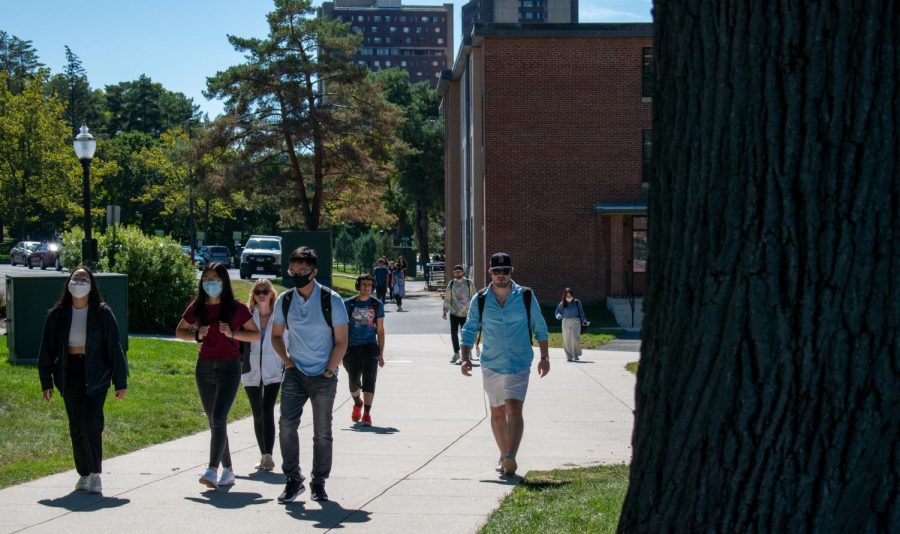There’s nothing quite like the dazed numbness of bureaucracy. During, an ongoing public health crisis, no sector silently slips failures through the cracks like college administrations.
Having already endured one semester of lockdowns, one would think that the University of Massachusetts would have streamlined the process of disseminating public health information. Yet, despite the increased threat of transmission, UMass only emailed one document to students concerning isolation protocols. This document, The Quarantine and Isolation Guide, contained unspecific recommendations for quarantine and left students unprepared to find a safe shelter. The two-page document made vague recommendations for isolation but dedicates an entire page on how to assemble a “go-kit” containing Twin XL sheets and self-care medication, among other items. This first appeared in an Aug. 19 email sent to the UMass community regarding COVID-19 information. The last reference appeared on Aug. 26, this time only found on the University News site.
Early in the semester, cases spiked during the week of Sept. 1 and continued to rise dramatically the following two weeks. Resident Assistants were put in difficult positions as student leaders and were expected to provide resources to their students.
In our conversation with UMass students who went through the testing process this semester, they expressed confusion over what was to be expected of them after receiving their test results.
One of these students is Wyatt Mitchell, a chemistry and philosophy double major. When waiting for his COVID-19 results, Mitchell was unsure of how he should prepare or isolate.
James Kubicek, a senior political science major, was unaware of isolation protocols available for off-campus students. Only after receiving a phone call four days following his initial self-test did he learn about his quarantine options. While most students didn’t need to resort to hotel living, each scrambled to find a place to isolate on behalf of the University’s negligence and ill planning.
In conversation with Jeffery Hescock, executive director of Environmental Health and Safety, he explained the Public Health Promotion Center’s strategy in communicating isolation protocols. “There was at least one message that got sent out to the campus community…There was a planning guide that was a part of that,” said Hescock.
The problem was that there was no mandate for departments to spread this information further. Residence Life, Student Affairs or weekly public health updates never shared this information with students.
Stating that the PHPC emails have a strong read open rate, Hescock felt confident that, based on, “The data from the conversations…people are understanding what they need to do in terms of going home, or [finding accommodations].”
Regarding communication between PHPC and other branches of leadership on campus, such as Residential Life, Hescock did not know if additional information was sent out. “RAs and RDs are not our main communication channel,” said Hescock, “It’s one communication channel as part of it.”
Jean MacKimmie, Director of Residence Education, only shared the PHPC email within the Res Life Microsoft Teams’ channel on Aug. 25. “I wanted to make sure that they had access to that document, even though they got the email…Raise this up and look at it a little bit more closely,” said MacKimmie.
There was no requirement that residence directors or peer mentors disseminate further information to the students or staff, such as residential assistants, according to MacKimmie.
“We want our RAs to point people in the right direction. To get people in the right direction as opposed to knowing it,” said MacKimmie.
It is unrealistic to assume that RAs should provide all information on campus happenings. Within their role as student leaders, however, they find themselves as the main provider of information for on-campus students. Their primary role is to direct students to campus resources. But, if they don’t even know the resources exist or are missing in the curriculum during floor meetings, how can they share with the student body? As a result, students like Gorfinkel and Mitchell find themselves without a place to go or plans to live for 10 days.
Public health information is ever-evolving and complex. There is no ideal communication channel for such a large student body. Even so, quarantine and isolation guides were not shared in an effective manner, meaning students had little incentive to keep a smaller social circle to limit possible transmission. Students were also ill-prepared to manage the financial burden of obtaining housing accommodations, such as paying for multiple nights in a hotel.
Resident Assistants are responsible for facilitating conversations on Title IX, racism in the community, putting flyers up for face coverings and giving out Halloween candy. Is having the resources to redirect a student regarding quarantine plans beyond the scope of their responsibilities? Residential Life seems to be concerned with the essential questions, like “What’s expected for the weekend?” as MacKimmie told us.
Last week, COVID-19 cases rose sharply, in part from the mass exodus of students returning from Thanksgiving break. And with a new variant looming on the horizon, it is more important than ever for the University to be clear and thorough in its public health messaging. If students get infected at a higher rate next semester, an inability to effectively inform the campus about protocols will inevitably lead to disaster. We can’t afford to leave the need for quarantine and isolation up to chance again.
Grace Fiori can be reached at [email protected] and followed on Twitter @grace_fiori. Ronan Fitzgerald can be reached at [email protected].




















